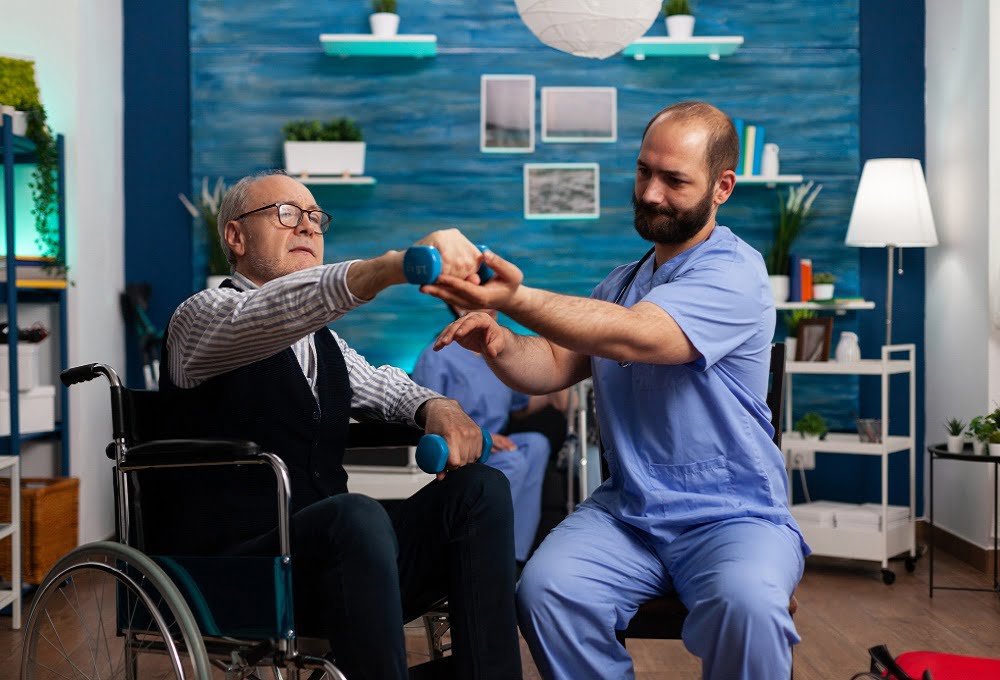With the passage of time and advancing age, many of our elderly people often suffer from weakness, as the body loses many of its muscular and movement capabilities, especially in cases of various diseases or exposure to fall accidents that result in fractures, etc., and here physiotherapy becomes an urgent necessity to restore the ability to move by practicing some therapeutic and sports exercises, manual therapy, the use of some devices, education, and advice. It also works to preserve the health of the elderly, and helps reduce the feeling of pain, prevent the exacerbation of some diseases, and accelerate the healing process.
But.. Why do some elderly people refuse to undergo recovering treatment programs?
There are various reasons that may lead some elderly people to refuse recovering treatment programs. There are some reasons related to patients’ general impression of treatment, as well as physical reasons, in addition to psychological reasons. These reasons can be detailed as follows:
- The general impression:
- Lack of understanding of the importance of physiotherapy and its vital role in restoring physical capabilities.
- Failure to appreciate the benefit of physiotherapy for the prevention of disabilities and limitations in daily activity.
- Patients’ previous negative experiences with a physiotherapist, influencing general judgment and subsequent experiences.
- Physical causes:
- The deterioration of the patient’s condition and lack of faith in the treating ability of sessions.
- Feeling unable to perform required exercises due to weakness or loss of physical ability.
- The distance and the exhaustion of moving to sessions in centers, clinics and hospitals.
- Fear of mixing and transmission of infection, especially in light of the spread of the Corona pandemic, which is still continuing until now.
- Psychological reasons:
- Poor mental condition due to the loss of the ability to take care of oneself and practice normal daily activities.
- Feeling of helplessness and despair of regaining physical abilities again, especially with aging.
- Lack of confidence in the outcome of treatment.
- Physiotherapy sessions continue for several months, and the results of improvement are slow, which causes the patient to become depressed and lose hope in reaching the required physical condition.
So.. What is the role of the patient in the success of the physiotherapy program?
At the beginning of treatment:
The patient must take care to do the following in the evaluation session with the physiotherapist to ensure that the appropriate recovering program is developed for the patient’s condition accurately and to achieve the maximum effectiveness of the treatment:
- Examination by a specialist doctor who then refers to a physiotherapist, such as an orthopedist or a neurologist.
- Communicate objectively and completely frankly with the doctor about the symptoms of the disease, what the patient feels, his goals for undergoing physiotherapy, the daily tasks and activities that the patient can perform after completing the recovering, the expected duration of the treatment program, etc.
- Full awareness of the role and duties of the physiotherapist and discuss the treatment plan to understand and prepare for it.
During treatment:
The patient must adhere to the following while undergoing the treatment program:
- Maintaining high morale and enhancing his confidence in the specialist and the treatment program.
- Commitment to sessions and keeping their appointments for speedy recovery.
- Commitment to do the required therapeutic exercises and follow any other instructions prescribed by the physiotherapist between sessions.
- Be patient and continue the treatment program until the end, and do not stop or cancel the program for any reason so that the situation does not worsen and the case deteriorates.
- Maintaining general health by adhering to adequate sleep, adequate rest, healthy nutrition, and appropriate activity.
Recovering Program:
The patient must ensure that the following is taken care of during the recovering program:
- Calm down and not rush into daily life or sports activities before reaching the stage of full recovery so that the patient does not suffer a relapse or get complications in the affected organ.
Members’ functional level and independence:
The patient and his family must cooperate and work to ensure that the functional levels of the organs and independence are maintained. This applies to many chronic diseases such as Parkinson’s and other diseases:
- Patient and family knowledge and awareness of the goals of physiotherapy in terms of maintaining and improving levels of function and independence, which helps improve the quality of life of individuals.
- Understand the fact that a physiotherapist uses exercise strategies to improve movement, its patterns, correct abnormal posture where possible, and maximize and enhance muscle strength and joint flexibility to correct and improve standing and balance and reduce the risk of falls.
Preservation and prevention:
Physiotherapy does not only aim to treat diseases, but also extends its goals to maintaining the physical condition and preventing potential diseases, so both the patient and his family must:
- Knowing the goals of physiotherapy that work to maintain the strength and flexibility of muscles and joints and the flow of blood circulation, which helps the vitality of the body and prevent the exacerbation of the disease, and reduce the risk of exposure to bedsores.
What is the role of DoktorCare in providing recovering services for the elderly?
Because there are many cases that cannot leave the house due to illness or the lack of special capabilities and equipment to move to a doctor or hospital, Especially in cases of the elderly, DoktorCare works to provide home physiotherapy sessions by a home physiotherapist to help patients regain their movement abilities using various scientific methods, exercise therapy and modern mobile devices to ensure a speedy recovery, taking into account the patient’s health condition, and the presence of the patient at home also helps in providing him a comfortable family atmosphere to reduce the feeling of tension, while ensuring complete privacy for the patient at his home.



